File handling-c programming language
- 1. 1 This session Outline Files Concepts File Programs Busy Bee Workshop – Session IXBusy Bee Workshop – Session IX
- 2. Console oriented Input/Output Console oriented – use terminal (keyboard/screen) scanf(“%d”,&i) – read data from keyboard printf(“%d”,i) – print data to monitor Suitable for small volumes of data Data lost when program terminated Busy Bee Workshop – FileBusy Bee Workshop – File
- 3. Real-life applications Large data volumes Need for flexible approach to store/retrieve data Concept of files Busy Bee Workshop – FileBusy Bee Workshop – File
- 4. Files File – place on disk where group of related data is stored E.g. your C programs, executables High-level programming languages support file operations Naming Opening Reading Writing Closing Busy Bee Workshop – FileBusy Bee Workshop – File
- 5. Defining and opening file To store data file in secondary memory (disk) must specify to OS Filename (e.g. sort.c, input.data) Data structure (e.g. FILE) Purpose (e.g. reading, writing, appending) Busy Bee Workshop – FileBusy Bee Workshop – File
- 6. Filename String of characters that make up a valid filename for OS May contain two parts Primary Optional period with extension Examples: a.out, prog.c, temp, text.out Busy Bee Workshop – FileBusy Bee Workshop – File
- 7. General format for opening file fp contains all information about file Communication link between system and program Mode can be r open file for reading only w open file for writing only a open file for appending (adding) data FILE *fp; /*variable fp is pointer to type FILE*/ fp = fopen(“filename”, “mode”); /*opens file with name filename , assigns identifier to fp */ Busy Bee Workshop – FileBusy Bee Workshop – File
- 8. Different modes Writing mode if file already exists then contents are deleted, else new file with specified name created Appending mode if file already exists then file opened with contents safe else new file created Reading mode if file already exists then opened with contents safe else error occurs. FILE *p1, *p2; p1 = fopen(“data”,”r”); p2= fopen(“results”, w”); Busy Bee Workshop – FileBusy Bee Workshop – File
- 9. Additional modes r+ open to beginning for both reading/writing w+ same as w except both for reading and writing a+ same as ‘a’ except both for reading and writing Busy Bee Workshop – FileBusy Bee Workshop – File
- 10. Closing a file File must be closed as soon as all operations on it completed Ensures All outstanding information associated with file flushed out from buffers All links to file broken Accidental misuse of file prevented If want to change mode of file, then first close and open again Busy Bee Workshop – FileBusy Bee Workshop – File
- 11. Closing a file pointer can be reused after closing Syntax: fclose(file_pointer); Example: FILE *p1, *p2; p1 = fopen(“INPUT.txt”, “r”); p2 =fopen(“OUTPUT.txt”, “w”); …….. …….. fclose(p1); fclose(p2); Busy Bee Workshop – FileBusy Bee Workshop – File
- 12. Input/Output operations on filesC provides several different functions for reading/writing getc() – read a character putc() – write a character fprintf() – write set of data values fscanf() – read set of data values getw() – read integer putw() – write integer read() – read data from binary file write() – write data into binary file Busy Bee Workshop – FileBusy Bee Workshop – File
- 13. getc() and putc() handle one character at a time like getchar() and putchar() syntax: putc(c,fp1); c : a character variable fp1 : pointer to file opened with mode w syntax: c = getc(fp2); c : a character variable fp2 : pointer to file opened with mode r file pointer moves by one character position after every getc() and putc() getc() returns end-of-file marker EOF when file end reached Busy Bee Workshop – FileBusy Bee Workshop – File
- 14. Program to read/write using getc/putc #include <stdio.h> main() { FILE *fp1; char c; f1= fopen(“INPUT”, “w”); /* open file for writing */ while((c=getchar()) != EOF) /*get char from keyboard until CTL-Z*/ putc(c,f1); /*write a character to INPUT */ fclose(f1); /* close INPUT */ f1=fopen(“INPUT”, “r”); /* reopen file */ while((c=getc(f1))!=EOF) /*read character from file INPUT*/ printf(“%c”, c); /* print character to screen */ fclose(f1); } /*end main */ Busy Bee Workshop – FileBusy Bee Workshop – File
- 15. fscanf() and fprintf() similar to scanf() and printf() in addition provide file-pointer given the following file-pointer f1 (points to file opened in write mode) file-pointer f2 (points to file opened in read mode) integer variable i float variable f Example: fprintf(f1, “%d %fn”, i, f); fprintf(stdout, “%f n”, f); /*note: stdout refers to screen */ fscanf(f2, “%d %f”, &i, &f); fscanf returns EOF when end-of-file reached Busy Bee Workshop – FileBusy Bee Workshop – File
- 16. getw() and putw() handle one integer at a time syntax: putw(i,fp1); i : an integer variable fp1 : pointer to file ipened with mode w syntax: i = getw(fp2); i : an integer variable fp2 : pointer to file opened with mode r file pointer moves by one integer position, data stored in binary format native to local system getw() returns end-of-file marker EOF when file end reached Busy Bee Workshop – FileBusy Bee Workshop – File
- 17. C program using getw, putw,fscanf, fprintf #include <stdio.h> main() { int i,sum1=0; FILE *f1; /* open files */ f1 = fopen("int_data.bin","w"); /* write integers to files in binary and text format*/ for(i=10;i<15;i++) putw(i,f1); fclose(f1); f1 = fopen("int_data.bin","r"); while((i=getw(f1))!=EOF) { sum1+=i; printf("binary file: i=%dn",i); } /* end while getw */ printf("binary sum=%d,sum1); fclose(f1); } #include <stdio.h> main() { int i, sum2=0; FILE *f2; /* open files */ f2 = fopen("int_data.txt","w"); /* write integers to files in binary and text format*/ for(i=10;i<15;i++) printf(f2,"%dn",i); fclose(f2); f2 = fopen("int_data.txt","r"); while(fscanf(f2,"%d",&i)!=EOF) { sum2+=i; printf("text file: i= %dn",i); } /*end while fscanf*/ printf("text sum=%dn",sum2); fclose(f2); } Busy Bee Workshop – FileBusy Bee Workshop – File
- 18. On execution of previous Programs binary file: i=10 binary file: i=11 binary file: i=12 binary file: i=13 binary file: i=14 binary sum=60, text file: i=10 text file: i=11 text file: i=12 text file: i=13 text file: i=14 text sum=60 Busy Bee Workshop – FileBusy Bee Workshop – File
- 19. Errors that occur during I/O Typical errors that occur trying to read beyond end-of-file trying to use a file that has not been opened perform operation on file not permitted by ‘fopen’ mode open file with invalid filename write to write-protected file Busy Bee Workshop – FileBusy Bee Workshop – File
- 20. Error handling given file-pointer, check if EOF reached, errors while handling file, problems opening file etc. check if EOF reached: feof() feof() takes file-pointer as input, returns nonzero if all data read and zero otherwise if(feof(fp)) printf(“End of datan”); ferror() takes file-pointer as input, returns nonzero integer if error detected else returns zero if(ferror(fp) !=0) printf(“An error has occurredn”); Busy Bee Workshop – FileBusy Bee Workshop – File
- 21. Error while opening file if file cannot be opened then fopen returns a NULL pointer Good practice to check if pointer is NULL before proceeding fp = fopen(“input.dat”, “r”); if (fp == NULL) printf(“File could not be opened n ”); Busy Bee Workshop – FileBusy Bee Workshop – File
- 22. Random access to files how to jump to a given position (byte number) in a file without reading all the previous data? fseek (file-pointer, offset, position); position: 0 (beginning), 1 (current), 2 (end) offset: number of locations to move from position Example: fseek(fp,-m, 1); /* move back by m bytes from current position */ fseek(fp,m,0); /* move to (m+1)th byte in file */ fseek(fp, -10, 2); /* what is this? */ ftell(fp) returns current byte position in file rewind(fp) resets position to start of file Busy Bee Workshop – FileBusy Bee Workshop – File
- 23. Command line arguments can give input to C program from command line E.g. > prog.c 10 name1 name2 …. how to use these arguments? main ( int argc, char *argv[] ) argc – gives a count of number of arguments (including program name) char *argv[] defines an array of pointers to character (or array of strings) argv[0] – program name argv[1] to argv[argc -1] give the other arguments as strings Busy Bee Workshop – FileBusy Bee Workshop – File
- 24. Example args.c args.out 2 join leave 6 6 leave join 2 args.out #include <stdio.h> main(int argc,char *argv[]) { while(argc>0) /* print out all arguments in reverse order*/ { printf("%sn",argv[argc-1]); argc--; } } Busy Bee Workshop – FileBusy Bee Workshop – File



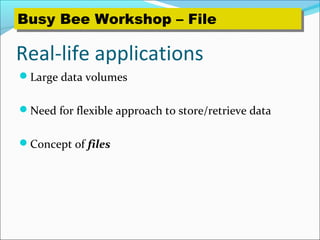

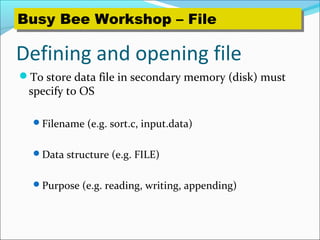

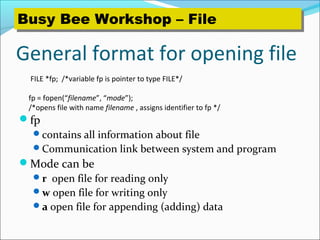
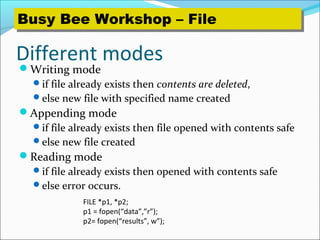

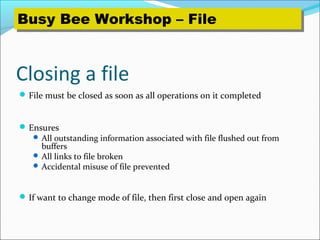
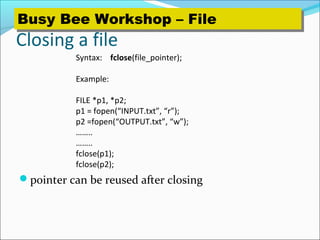

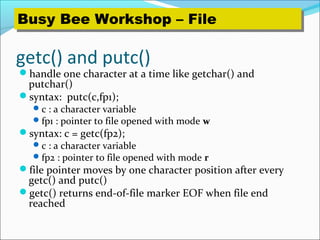
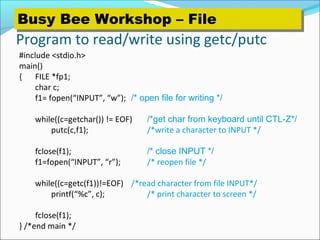
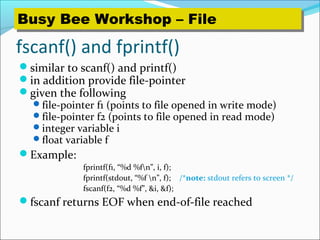

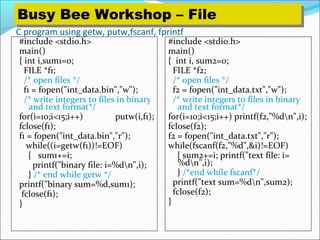

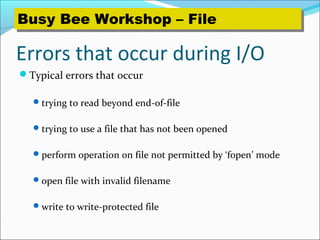
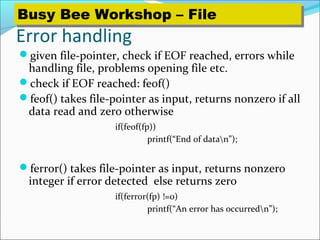

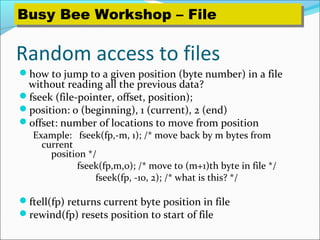
![Command line arguments
can give input to C program from command line
E.g. > prog.c 10 name1 name2
….
how to use these arguments?
main ( int argc, char *argv[] )
argc – gives a count of number of arguments (including
program name)
char *argv[] defines an array of pointers to character (or
array of strings)
argv[0] – program name
argv[1] to argv[argc -1] give the other arguments as strings
Busy Bee Workshop – FileBusy Bee Workshop – File](https://image.slidesharecdn.com/file-handling-cprogramminglanguage-151211040212/85/File-handling-c-programming-language-23-320.jpg)
![Example args.c
args.out 2 join leave 6
6
leave
join
2
args.out
#include <stdio.h>
main(int argc,char *argv[])
{
while(argc>0) /* print out all arguments in reverse order*/
{
printf("%sn",argv[argc-1]);
argc--;
}
}
Busy Bee Workshop – FileBusy Bee Workshop – File](https://image.slidesharecdn.com/file-handling-cprogramminglanguage-151211040212/85/File-handling-c-programming-language-24-320.jpg)

